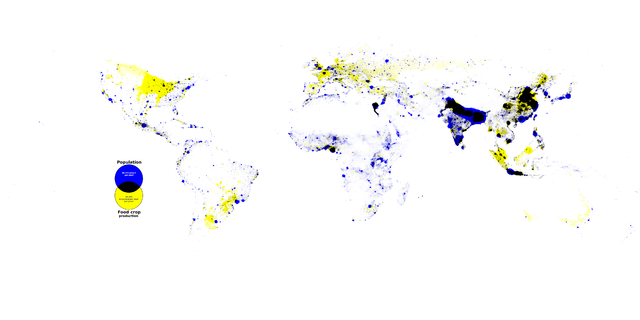Local food: Difference between revisions
No edit summary |
No edit summary |
||
| (2 intermediate revisions by the same user not shown) | |||
| Line 1: | Line 1: | ||
Some say that local food is better for the environment, because | Some say that local [[food]] is better for the environment, because the food is shipped a shorter distance. But does this really save [[energy]] overall? {{rn}} | ||
==Analysis needed== | |||
''This page is incomplete. It needs:'' | |||
* ''specific'' examples of cases where local food is '''better''' for the environment | |||
* ''specific'' examples of cases where local food is '''worse''' for the environment | |||
* research / data analysis to back up the claims. | |||
==Analysis needed - factors to consider== | |||
===Food transportation footprint=== | ===Food transportation footprint=== | ||
In which cases does local food actually save fuel, and in which cases does it use more? Consider [[economies of scale]] in shipping. | In which cases does local food actually save fuel, and in which cases does it use more? Consider [[economies of scale]] in shipping. | ||
===Food production footprint=== | ===Food production footprint=== | ||
Food ''production'' might have a much bigger ecological footprint than ''transportation''. {{qn}} | |||
In which case, we have to be mindful of tradeoffs. Sometimes, a region might be better{{x|more energy-efficient}}at producing a certain food. Growing it there and shipping it elsewhere, might actually use less energy overall. {{xn}} | |||
===Perishable vs non-perishable foods=== | ===Perishable vs non-perishable foods=== | ||
| Line 14: | Line 21: | ||
We want to use existing farm land, not destroy more forests/habitats just to farm somewhere else. Is the most productive farm land close to where people actually live? | We want to use existing farm land, not destroy more forests/habitats just to farm somewhere else. Is the most productive farm land close to where people actually live? | ||
[[File:map-population-foodProduction.png]] | ==Food & population map== | ||
Some areas produce more food. Other areas have more people. Here's a map of food crops (yellow) overlapping with population (blue): | |||
[[File:map-population-foodProduction.png|640px|title=food crop production in yellow, population in blue]] | |||
Latest revision as of 22:32, 21 May 2023
Some say that local food is better for the environment, because the food is shipped a shorter distance. But does this really save energy overall? [RESEARCH needed]
This page is incomplete. It needs:
- specific examples of cases where local food is better for the environment
- specific examples of cases where local food is worse for the environment
- research / data analysis to back up the claims.
Analysis needed - factors to consider
Food transportation footprint
In which cases does local food actually save fuel, and in which cases does it use more? Consider economies of scale in shipping.
Food production footprint
Food production might have a much bigger ecological footprint than transportation. [QUANTIFICATION needed]
In which case, we have to be mindful of tradeoffs. Sometimes, a region might be better
Perishable vs non-perishable foods
Non-perishable foods can be shipped more slowly, which can save fuel in some cases. Also, if food is dried or concentrated, then the same food has less weight to transport.
Existing farm land
We want to use existing farm land, not destroy more forests/habitats just to farm somewhere else. Is the most productive farm land close to where people actually live?
Food & population map
Some areas produce more food. Other areas have more people. Here's a map of food crops (yellow) overlapping with population (blue):
